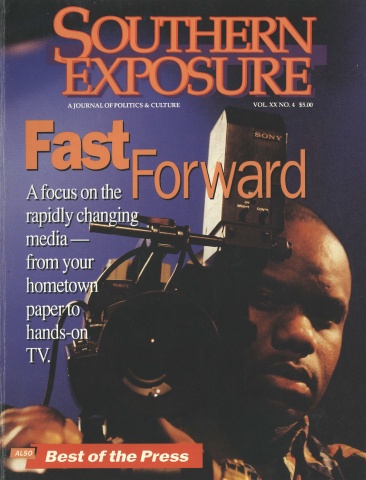At the Fiddle Contest, 1926

This article originally appeared in Southern Exposure Vol. 20 No. 4, "Fast Forward." Find more from that issue here.
Church is diferrent,” Pa said.
“Everybody’s got their mouth open and everybody’s looking at God.”
I put a slice of Cheddar on top of his peach pie. “Remember Leola got stranded by the war.”
So here we are, viewing the prizes on stage, a pair of cotton socks, big, Pa’s size, a sack of flour, and two green dollar bills clipped together like husband and wife. Pa holds my hand. They never let a girl sing before. The crowd will love Leola like Pa and I do.
I hope there’s a mirror backstage. Leola’s hair’s wild and yellow as dandelions. Mine’s silver strands among the gold. Pa’s is all gray. It looks like combed metal.
If we win the two dollars, if Leola wins the two dollars, Pa can drop it in the collection plate on Sunday. But I don’t say this right now. I don’t want to jinx Leola.
Two boys are playing guitars but I like a whole band.
I usually dream of Leola being swept toward the altar on a hymn, stepping free of Pa’s arm, me and the kinfolk smiling. Just like Mellie Ivy is smiling way up front strapped in a new calico, prowling.
The boys are singing high harmony:
Two old maids playin’ in the sand
Each one wishin’ the othern was a man
I like a whole band like Leola has behind her, a banjo, the fiddle high and slow and mournful, a bass to thump like frogs in the spring. A guitar strumming, strumming like the twang against my fingers when I hang clothes to dry. I make the line shiver, the string on a fiddle. Shirts bow to pink petticoats. Clothes swing to my music. Britches throw a leg over like they’re climbing a fence.
Two old maids done lost their style
If you want to be lucky you got to smile
Mellie Ivy’s slim and has nice wavy hair, brown but there’s something about her that makes me think of a birch when it’s peeling, all that white papery bark curling away from something thick inside, something that’s not white or papery at all. She puts the rouge on thick. She’s Leola’s friend, stranded, too.
I’ll clap for the guitar boys, but soft as if I’m wearing gloves.
There’s Leola’s band. Grundy, Andrew, Jake, but no Leola. Probably waiting to bring her on like the queen of surprises. It’s a new fellow going to sing. But the voice — Leola.
In a man’s suit. In her dead brother’s clothes. His boots that I blacked and blacked, kept ready for him to come back across the waters and take up the plow again. Leola’s chance blown up like Arthur’s last view. A land mine, jagged light, then sweet blue air, warm, like the morning he first took a step, careful already around the mud hole where the hound dog slept. His shoes dancing on the stage.
It’s all I can see.
Them black boots, big humped-toed grins stomping the boards. Him. Arthur. And everybody laughing. The whole hall laughing and Leola a grin bigger than the boots as she sings, the pants tight and slim around her legs, the shirt starched just so, her hair hid in a bowler.
Pa’s fidgeting, laughing to go along with the crowd, his hand weeping in mine. At home it will harden against me.
Gone. I should be gone. Each song long as cancer.
My fool girl.
Singing and dancing and hallooping all over the stage like a stable boy. I crisped the eyelet, crisped her hair, sewed the edges of the rags to hold her curls.
Mellie Ivy pink as a chigger.
Pa about to explode, about to walk up to the stage and jerk Leola from it, knock down the hat, pull off the pants and starched shirt and her dead brother’s boots and make her stand up there like that, make her understand what she is.
I pray that he’s too old, my hand in his vise, my hand crushed and swelling.
Tags
Lynn Pruett
Lynn Pruett is a writer who lives in Tuscaloosa, Alabama. (1992)
Lynn Pruett is a writer who lives in Tuscaloosa, Alabama. This is her first published, short story. (1991)